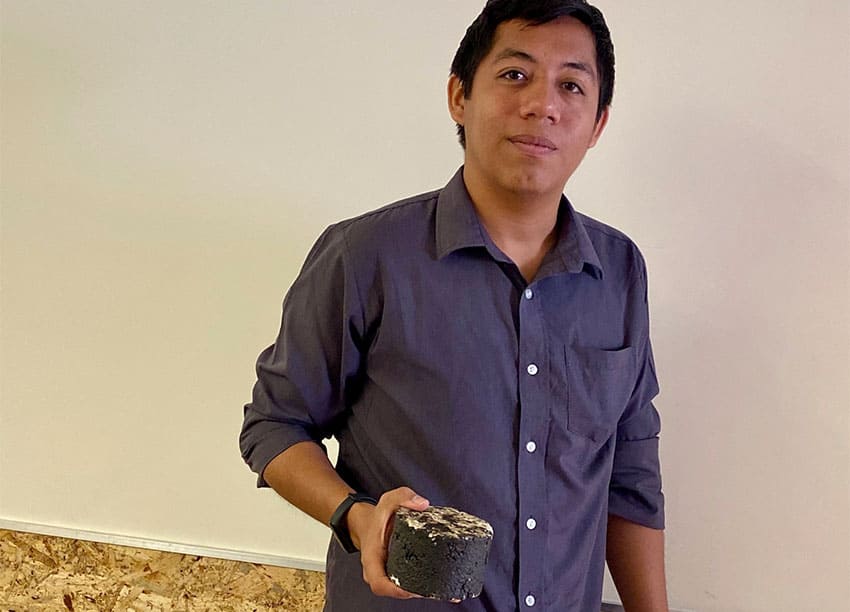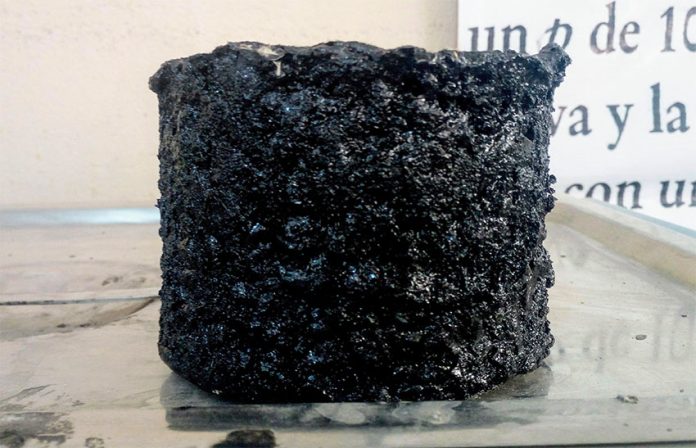Rubber pavement that regenerates with rainwater is the national winner of the James Dyson Award, an international award that challenges students and recent graduates to design something that solves a problem.
Created by Israel Antonio Briseño Carmona, a student at the Coahuila Autonomous University in Torreón, the self-regenerating pavement is made out of discarded tires.
Regeneration of the pavement occurs through the absorption of rainwater, a process that prevents road damage such as potholes.
Briseño said that his inspiration for the idea was a question: why do potholes appear every time it rains?
“What happens is that when it rains, water filters down to the sub-base creating a fault and when a car goes over it, it collapses. That’s why I wanted to turn the main agent of deterioration [asphalt or concrete] into an agent of recovery [rubber]. With my project, water would be a [source of] maintenance for our roads,” he explained.

Briseño obtained a patent for his unique idea in April under the name Paflec. It has not yet been used to build a road but Briseño hopes that will change soon.
He explained that he has a three-phase plan to make his road-building idea a reality.
The first phase involves meeting with an engineer to “resolve doubts” about the project and then building a short section of road to ensure that it functions as envisaged. The second phase is to certify the construction system with the national building certification organization ONNCCE and the third phase is to gain approval from the Secretariat of Communications and Transportation.
“In the medium term, I would like to start my own construction company to be able to implement my invention,” Briseño said.
The James Dyson Foundation also announced two Mexican runners-up, which along with the self-generating pavement are in contention for the international James Dyson Award that comes with a cash prize of 730,000 pesos (US $37,000).
The first runner-up is an automatic hygiene system designed by a team of students from the Emiliano Zapata Technological University in Morelos.
Called HA-WA (short for hand wash), the system makes use of infrared sensors to trigger the release of water and soap for washing the hands. It both reduces the amount of water that is used when the everyday action is performed and allows the water to be recycled for other domestic purposes such as the flushing of a toilet.
The second runner-up is an invention by Mexico City industrial designer Rafael Riego: crutches made out of recyclable cardboard.
The young entrepreneur said the aim of his idea is to make crutches available at a low cost to everyone who needs them.
“I downhill skateboard and have practiced martial arts my whole life, sports where ankle and knee injuries are prevalent . . . Having to use crutches many times I started paying attention to people with the same type of injuries. Not everyone has access to medical grade orthopedics and have to resort to homemade, unsafe methods,” Riego said.
“I’ve designed a low-cost method that is easy to manufacture to get everyone back on their feet safely.”
The international finalists, each of whom will win 120,000 pesos, will be announced October 17. The grand-prize winner will be announced November 14.
Source: Expansión (sp)
